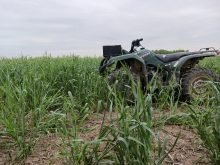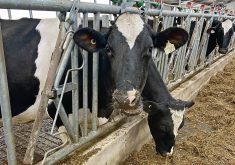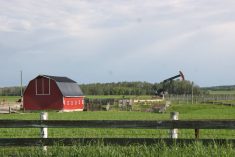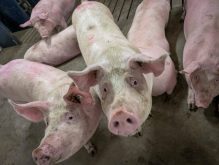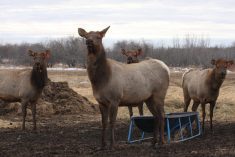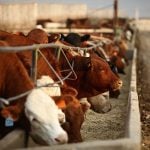Contract protection Ontario pig producers are faring better than those in the West, says FCC’s Lyndon Carlson
Federal agriculture minister Gerry Ritz is monitoring the financial problems facing hog producers, but he’s not prepared to offer the ad hoc assistance some are seeking for the industry.
“Well, I’m not a big proponent of ad hoc programs,” Ritz told reporters Sept. 22 after speaking at the Canadian Farm Writers Federation’s (CFWF) annual meeting in Winnipeg. “It masks market signals. It doesn’t allow the industry to adapt.”
Skyrocketing feed prices in the wake of drought in the United States, Country of Origin Labelling (COOL) and the high Canadian dollar forced two of Canada’s biggest hog producers — Saskatchewan-headquartered Big Sky Farms and Manitoba-based Puratone Corp. — to seek creditor protection last this month.
Read Also

Prairie winter snowfall forecast 2025-2026
How much snow should farmers in Alberta and elsewhere on the Canadian Prairies expect for the rest of December 2025 and into January-February 2026?
Manitoba’s Keystone Agricultural Producers added its voice to the call for additional support, calling for $150 million to tide Manitoba producers over until market conditions improve.
“Manitoba’s pork industry needs help — and it needs help now,” said KAP president Doug Chorney. “Two months is too long to wait. For some farmers, two weeks might even be too late.”
But he stressed that hog producers aren’t looking for a handout; they’re asking for the federal and provincial governments to provide interim financing to producers.
“Commercial lenders are starting to lose confidence in the market,” said Chorney. “And producers are in a vulnerable position because they have nowhere to get credit … the symbolic failings of two big companies has really put a lot of fear in other potential providers
Integration
Ritz said part of the solution is for hog-producing companies to become even more integrated.
“We look with pride at what HyLife has been able to do under the same circumstances,” he said of the Manitoba-based company, which owns its own pork-packing plant at Neepawa, Man. “There’s a lot of good positive things to emulate from the HyLife structure.”
In a statement HyLife, Canada’s largest hog processor, said it’s optimistic about the future of the hog business.
Hog producers in Ontario are doing better than those out West, Lyndon Carlson, Farm Credit Canada’s senior vice-president of marketing, told the CFWF meeting.
“They’ve got some fairly secure delivery contracts that have actually seen some of those hog barns growing in the last couple of years when some of the Prairie farmers haven’t been growing,” he said.
Hog-producing Hutterite colonies are also fairing better because they are generally well diversified, he said.
“They’ve got lots of enterprises so they can balance things out when times are tough.”
In an interview later Carlson said Ontario hog producers are typically smaller and have less debt than those in the West.
“When you’re as big as some of the very biggest players you’re burning through some real big dollars every month,” Carlson said. “It’s hard to sustain.”
Hog production in Manitoba and Saskatchewan expanded 10 years ago, but much of it was done with borrowed money, he said.
“If they just had a little more sustained period of profitability they’ve would’ve been able to get their balance sheet in much better shape, but they just couldn’t get that break,” Carlson said. “I would not point a finger at the management because I know some of these guys. These guys are very competent.”
Of FCC’s $24 billion in loans, about a billion has been loaned to the hog sector, Carlson said. FCC will “stand by our customers as best we are able,” he said.
That’s something Ritz said he’d like other lenders to do.
“I would like to see… a more fulsome agenda from the lending institutions — banks and credit unions — that once they get into the farm sector they stay in,” he said. “You know this in-and-out on an annual basis doesn’t help anyone. Farming is a very dollar intensive business and they need some long-term stability there.”



